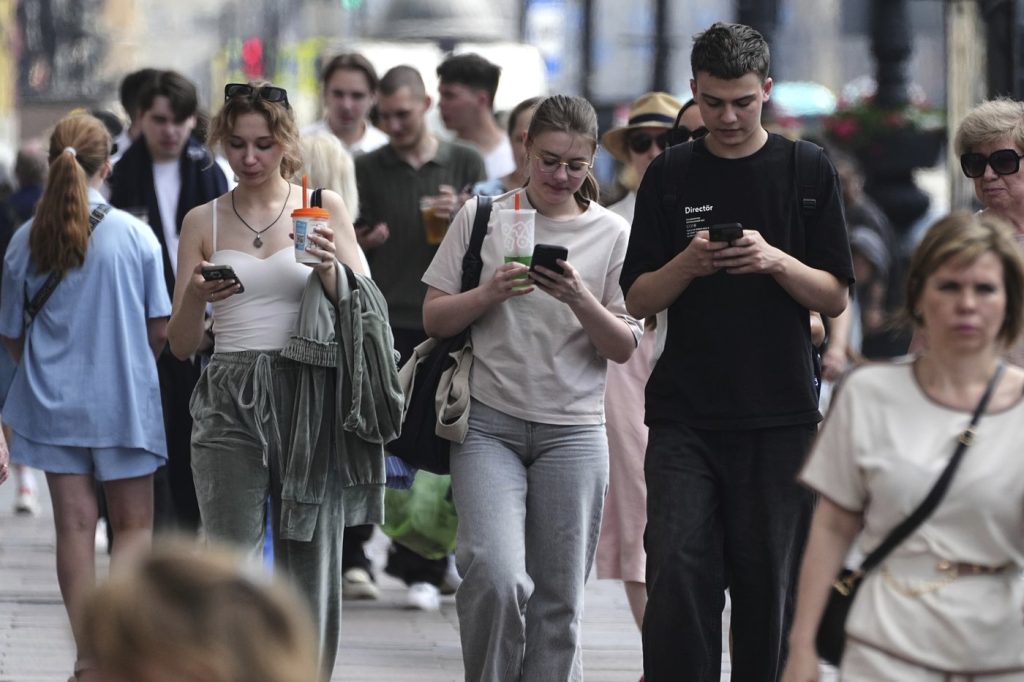TALLINN, Estonia (AP) — A catchy rap song by Pavel Osipyan, a blogger from Rostov-on-Don, Russia, has garnered over half a million views on Instagram in just two weeks. The lyrics humorously express his frustrations with poor internet connectivity, stating, “How to say you’re from Rostov without saying a word? Show one bar of cellphone service.” Osipyan describes the struggle of having limited internet access, impacting his ability to pay for groceries electronically and forcing him to rely on paper maps while driving.
The issues highlighted by Osipyan are widespread and not limited to Rostov-on-Don, a city near Ukraine and home to Russia’s Southern Military District, which has recently been subjected to drone attacks. In the past two months, numerous Russian regions, including parts of Siberia and the Far East, have experienced cellphone internet shutdowns. These interruptions are reportedly implemented to prevent potential threats from Ukrainian drones, causing disruptions in mobile and broadband services.
Residents of the affected areas have reported difficulties with card payments, non-functioning taxi and ride-sharing apps, and inconsistent ATM services. Experts have raised concerns about these unprecedented measures, warning that they could have dire consequences in a country where online freedoms have already been severely restricted by the Kremlin.
The trend of internet disruptions reportedly began in May when Russia celebrated the 80th anniversary of the victory over Nazi Germany in World War II, coinciding with a significant military parade in Moscow attended by foreign dignitaries. The disruptions in connectivity during this period were confirmed as deliberate restrictions by Kremlin spokesperson Dmitry Peskov, who stated that these measures were aimed at enhancing security against Ukrainian drone attacks.
Experts point out that the drastic and widespread shutdowns across Russia serve as a signal for regional authorities, showcasing the usefulness of such restrictions. Following major drone attacks on Russian soil, officials became increasingly eager to implement connectivity restrictions. By mid-July, the deliberate shutdowns expanded to cover most of the country, affecting 73 out of over 80 regions. Reports indicated that in 41 of these regions, broadband services were down as well.
Some regional authorities have justified these internet shutdowns as necessary for security reasons. For example, Nizhny Novgorod Governor Gleb Nikitin announced that such measures would remain effective as long as there are perceived threats. When questioned about the justification for mass shutdowns, Peskov stated that measures ensuring citizens' safety are deemed justified and prioritize public safety.
The outages can last from hours to days, leading to unpredictable disruptions that vary even within small geographical areas. For instance, a resident in Voronezh described feeling “like she was in a cave” due to her lack of connection at home, while another from Samara mentioned that service tends to fail at unexpected moments. Connectivity challenges have also impacted businesses, with some retailers in Omsk experiencing a week-long outage.
In rural regions, where cellphone internet is often the only means of online access, disruptions have resulted in serious complications. Pharmacies, as reported by the Independent Pharmacies Association, have struggled to function without internet connection, complicating prescription logging. In villages within the Belgorod region, residents have resorted to using rail to alert neighbors about potential attacks due to the lack of cellphone connectivity.
As part of efforts to mitigate the situation, authorities have announced plans to introduce Wi-Fi spots and possibly establish an agency to coordinate future shutdowns. Notably, the Kremlin’s control over the internet has intensified, following years of active censorship that blocked independent media and opposition voices.
Russian and Ukrainian drones rely on cellphone networks for operation, making the shutdowns part of the government’s strategy to limit drone capabilities. However, this also aligns with the Kremlin’s long-term objective to exert greater control over the internet. In recent years, the Russian government has restricted access to major social media platforms and messaging applications, tightening its grip on information flow and digital freedoms.
Overall, the recent internet service interruptions illustrate a dual challenge for Russians: grappling with the immediate impacts of connectivity issues and adapting to growing internet restrictions that threaten to shape the nation’s digital landscape.











